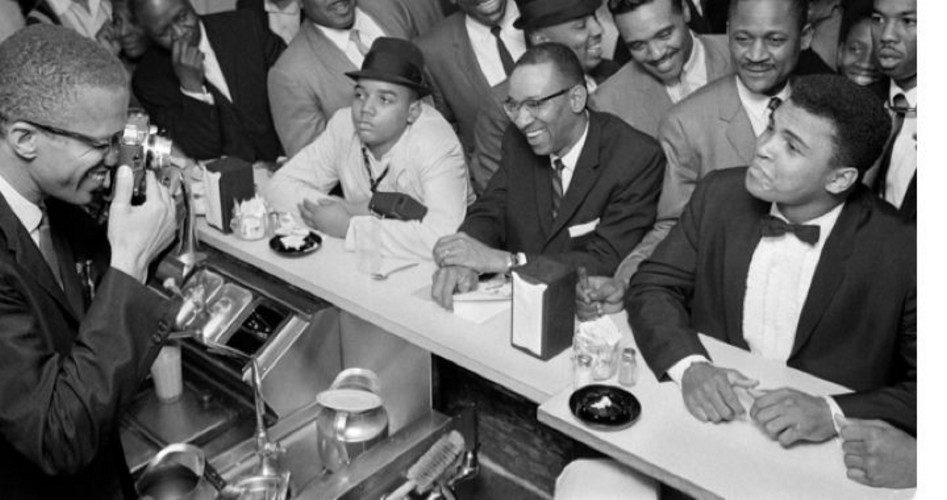
A pugilist, humorist, and activist, Muhammad Ali (shown bottom right in 1964) was as controversial as he was colorful. Quick-witted, footed, and fisted, he entertained audiences in and out of the ring, pummeling opponents until he was finally pummeled by Parkinson’s, the disease that ended his boxing career and, finally, his life on June 3. Ali was 74.
Born January 17, 1942 in Louisville, Kentucky, and named Cassius Clay, the future heavyweight champ began boxing at age 12 after his new bicycle was stolen. Teary-eyed, he found policeman Joe Martin and exclaimed, “If I find the kid who stole my bike, I’ll whup him!” Clay never found the kid, and Martin never found the bike, but the officer did invite young Cassius to join a boxing gym he ran — and the rest is history.
And Clay would make history; whether or not he really was “the greatest” boxer ever, as he branded himself, he certainly was the loudest and most loquacious one. Known for boastfulness, quips such as “I’m so quick, I can turn off the lights and be in bed before the room gets dark,” and the recitation of clever poems on TV, Clay was once dismissively dubbed the “Louisville Lip” by the press. But his loquacious lip was by design — and not completely his own design. While Clay was naturally gregarious, he only became a master of self-promotion after an encounter with the foppish, flamboyant, and purposely villainous pro wrestler Gorgeous George in Las Vegas in 1961. After meeting the aging wrestler at a radio station, Clay attended his match and realized that playing the “heel” was marketing gold. As George told the young pugilist in the dressing room post-fight, “Boxing, wrestling — it’s all a show. A lot of people will pay to see someone shut your mouth. So keep on bragging, keep on sassing, and always be outrageous.” And thus was a showman born.
Of course, Clay had the talent to back up his mouth. After winning the 1960 Olympic Gold Medal in the light-heavyweight division, he went on to a successful professional career, capturing the heavyweight title at age 22 in a surprising upset defeat of the menacing Sonny Liston. And that historic bout would be just the first of many. Fighting as “Muhammad Ali,” some of the others were the “Fight of the Century,” “Super Fight II,” and the “Thrilla in Manila” against main rival Joe Frazier; and 1974’s “Rumble in the Jungle,” in which he again was a steep underdog but defeated the seemingly invincible George Foreman to win the heavyweight title for a second time. Ali later would become the first man to win that title thrice, regaining the belt from Leon Spinks in 1978.
Yet Ali’s boxing and marketing genius lay in stark contrast to his actions beyond the fight game, where he too often glommed onto the wrong causes for the wrong reasons. And while the man influencing him in the gym and ring — trainer Angelo Dundee — was above reproach, Ali’s influences beyond the ring were often toxic.
Most notably, Ali gravitated toward the vile hate group the Nation of Islam. Under the influence of its then-leader, Elijah Muhammad, he changed his name first to Cassius X and then Muhammad Ali, rejecting what he called his “slave name.” Yet he had things backwards. As liberal columnist Phil Mushnick wrote Sunday in “Debunking the myths that have glorified Muhammad Ali”:
[The man Ali was named after,] Cassius Marcellus Clay, 1810-1903, was a Kentucky planter, politician and newspaper publisher who, at enormous risk, was a devoted abolitionist in a state — Ali’s home state — where anti-slavery activism could and did leave one dead.
In 1843, Clay survived a bullet fired by a hired gun of slavery proponents. The founding publisher of an anti-slavery Lexington newspaper, Clay’s shop was wrecked by a mob. Undeterred, he published from Cincinnati.
When Abraham Lincoln was elected president, Clay, appointed minister (what we now call ambassador) to Russia, was among the first and most relentless to urge Lincoln to act to end slavery. Clay donated the land on which Berea College, in 1855, opened — for all races.
The kicker is that Islam’s so-called prophet, Muhammad, owned slaves — including black slaves. So, ironically, boxer Muhammad Ali’s choice was to reject the name of a staunch abolitionist and adopt the name of a slave master.
Ali would later reject the Nation of Islam, but not Islam itself. Yet Muslims have always figured prominently in the slave trade; hundreds of years ago, Arab flesh traders would kidnap young European and African boys, castrate them, and sell them into bondage. And while it was Christian civilization that finally outlawed slavery (first in Europe, then the United States), African Muslims continue to enslave black Africans to this day.
Mushnick also makes the point that Ali, and his media enablers, contributed to the coarsening of society. As he wrote:
Ali was able to — allowed to — popularize and commercialize trash-talking, name-calling and chest-pounding — something we’ve never recovered from — as few in the media wish to be identified as uncool, to knock something not in society’s best interests, applauding acts of bad-is-good they’d never encourage in their own.
And so, in Ali’s rise, pandering flowered and remains in full, no-upside bloom. “Hah, hah, ain’t he/wasn’t he great?” Well, it depends. He was a great boxer, a world-beater. But a world-changer? For the better? Where? How?
In addition, Mushnick tells us that it’s partially a myth that Ali was the champion of the anti-Vietnam War Left while rival Joe Frazier represented “the establishment.” Mushnick says that he was a long-haired hippie in the 1970s, and he and many of his philosophical soul mates were pulling for Frazier because of how Ali cruelly baited him. And, truth be known, while Ali could be engaging, he often did cross the line; for example, he would call figures such as Frazier, Floyd Patterson, and even the dignified Joe Louis “Uncle Toms.”
Yet the reality is that all those men might have had a more positive impact on society than did Ali. Louis, for instance, is considered by many the first true black American hero. When he fought German Max Schmeling in 1938, he came to represent America’s struggle against Nazism (unfairly, in a sense, as Schmeling was no Nazi). And by always conducting himself with dignity and integrity, he did far more for race relations than those lobbying for rights while committing wrongs and screaming about “white devils.”
It’s clear from Ali’s many interviews that he was charming, engaging, and light-hearted. It also appears that he generally treated people well on a personal level, as his late trainer Angelo Dundee indicated himself. As for the myth surrounding the man, that’s a failure of the wider society. If we’re going to elevate Gorgeous Georges above George Washington and Muhammad above Cassius Marcellus Clay, then we’re simply ending up with the heroes we deserve.
Photo of Muhammad Ali: EPHouston



